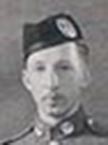
Our veterans
Rodney Preece
Rodney was born January 14, 1917, in Hawkesbury, ON, to George and Lillian Preece (born Marchan).
On September 18, 1939, Rod enlisted in the Cameron Highlander Regiment as a Machine Gunner. In July 1940, Rod and his group went to Halifax and, from there, sailed to Iceland where they served for ten months. The HMS Hood escorted the convoy.
Arriving just before Christmas 1941, Rod was posted at Toward Castle near Dunoon, just outside Glasgow, Scotland. Later he was posted to Lord Nuffield’s estate located at Bookham, Surrey, south of London.
On D-Day plus 5 (June 11, 1944), Rod left Liverpool, England, and arrived at St. Aubin, France, with the Imperial Black Watch Regiment. The Canadians had Bren Gun Carriers (small tracked armored vehicles), and the Imperial Black Watch had tanks. A couple of tanks were lost over the side in rough seas, and they were delayed two days before getting onto the beach. The boat they were in became stuck on a sand bar near some sunken ships in the harbour. Fortunately, the distance was at the German guns’ range limit, so the Canadians were not hit. They finally landed with four Bren Gun Carriers.
Rod’s platoon of 20 were mostly English-speaking but included some French Canadians. All were Cameron Highlanders from the Ottawa Valley and Eastern Ontario. They were continually being posted to other units as the need arose. During the campaign through France, Belgium, Holland, and Germany, they lost six or seven men out of their group from D-Day to the end of the War.
Rod remembered specific incidents in particular. One was at Carpiquet, Normandy, close to what is today the large Caen Airport. The soldiers were all bedded down, and Rod was sleeping under a tarpaulin secured to the back of a Bren Gun Carrier. Suddenly the Germans mounted a counter-attack; Rod jumped on a Bren Gun and started firing, although he couldn’t see much in the dark. The Germans finally withdrew. In the morning, he saw that a German mortar shell had entered the ground beside the place where he had been sleeping. The shell had not detonated.
Another incident took place when they were attacking the same airfield at Carpiquet. Rod was face down in a ditch, trying to stay below the heavy German anti-aircraft artillery used to defend the airport against the Canadians, when he was struck on the head with something that felt as if someone had hit him with full force. His face was pushed into the dirt, and when he touched the top of his helmet, it was red-hot. A piece of shrapnel from above had sliced into his helmet, cutting a gash into the top. When the incident was over and the airfield was taken, one of the senior officers took his helmet to show others. Rod never saw the helmet again, and it took him several days to get a replacement. Rod kept the piece of shrapnel for many years.
Another incident occurred close to Carpiquet, at a small town called Le Mesnil-Patrie. Things were slow, and there was a gap of some 200 yards in the firing line between themselves and the Germans. When both sides would be building up strength before attacking again, there would be a lull in fighting. Therefore, when they had the chance, the Canadians would go back to eat and rest at HQ, set up at Le Mesnil-Patrie about 150 yards from the firing line. While returning on one occasion, Rod and those with him spied something in the rubble, a small door covered with cobwebs. They shot off the lock and found a wine cellar full of wines and liquors. The party started! When the senior brass found out what was going on, they threw in a couple of hand grenades and blew the place up. Then they demanded that any remaining wine be handed over, to be distributed fairly but in small amounts.
At the end of hostilities, Rod was in Apeldoorn, Holland. From there, he was posted back to England to play with the Cameron Highlander Regimental Pipe Band.
From England, Rod returned to Canada on the SS Île de France to Halifax, then via CPR train to Ottawa. Although they were to go straight through to Ottawa before being dispersed, he and fellow Hawkesbury lads, Pete Cameron and Remi Laviolette, jumped the train as it went through Vankleek Hill. Rod recalled phoning his parents, who then arranged for Dr. Kirby, a dentist in town, to drive up in his big 1940 Buick to bring the lads back to Hawkesbury.
Rod was discharged on September 13, 1945, after serving six years and three days. Following his return home, Rod opened an Auto Body Shop on John Street, in Hawkesbury. Later, in 1960, he went back to Canadian International Paper (CIP) where he had worked before enlisting. Rod retired from CIP in 1982.
He passed away in 2008.
